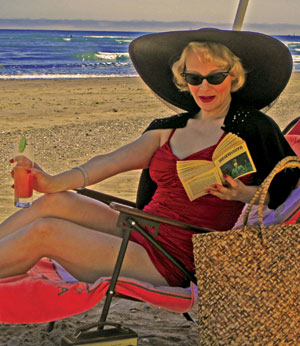After Cinequest winds down this weekend, there will still be a chance for film buffs to experience an outlaw noir romance screened inside an art gallery.
Berkeley paratheatrical researcher and author Antero Alli returns to San Jose on March 16 to present his 10th feature film, Flamingos, at Anno Domini.
Last year, Alli crystallized in San Jose to screen his last film, To Dream of Falling Upwards, a rip-roaring-hysterical and esoteric ridicule of occultists, a complex spider web of magick, ritual, sacrifice, murder, S&M and clowns.
This time, Alli decided to go the simple route. He even crewed a few of the scenes by himself, working with nothing but a Canon XL2 and some lighting.
“With every movie I set a new challenge,” he told me. “To Dream of Falling Upwards was probably my most complex and ambitious piece to date, and I really felt like I needed to return to a more intimate setting and a more personal story. I wanted to explore a romance. I also wanted to mingle crime and romance together. I had never done that before, so that was the challenge.”
Much of Flamingos takes place in a seedy hotel room, but one that actually has a microwave. The quintessential suburban drug addict and bank robber Ray (Joe Estlack) and his lover, Zoe (Madeline H.D. Brown), hide out in the room after Ray knocks off a bank by hypnotizing the employees.
Together, they sift through the money and argue about where to retire. He wants to go native in the Himalayas while she desires a hippie jungle utopia in Brazil.
Only two other milieus exist in the movie. Turns out Ray is actually married to Zoe’s sister, Beatrice (also played by Brown), who is currently suing for divorce. She solicits the help of an attorney to bring proceedings.
Thus we witness her interaction with the attorney, intertwined with the scenes in the seedy hotel room, presenting a troubled triangle of affairs. Ray and Zoe’s relationship seems destined for a cataclysmic rupture of some sort.
The third setting, perhaps the most mystical and unknown component of this very simple, yet emotional story, involves what Alli refers to as the bardo interzone. We experience dreamlike sequences, interactions from another realm of consciousness, where psychic entities unravel Ray and Zoe’s thoughts. Are they counselors? Muses? Advice goddesses? We don’t really know, but at the least, Alli sees them as entities playing off the emotions of the material characters in the dive motel room.
As Ray and Zoe’s relationship continues to go nowhere, the interactions with the entities in the bardo interzone begin to intensify. The actions of Ray and Zoe begin to affect the entities as well, not just the other way around.
“Just out of my own experience with different types of catastrophic romances and doomed love and so forth, there’s kind of a spooky echo I’ve experienced every time I’ve been in those situations,” Alli explained. “Almost like I’m alerting spirits from a different dimension to come in and feed off of some of the wild and often times negative energy generated by these out-of-control passions.”
Local band Artemesia Black provided a tune for the soundtrack, a Goth conjuring called “Oysters,” based on a cabaret performer named Irma Fox. Using the character of Fox as a muse when performing, the band channels her and explores her dark story.
“Irma Fox was actually killed by one of her lover’s wives,” explained Artemesia Black’s Sabine Heusler. “She fell dead onstage. So the whole thing about the song was Irma Fox, and I tell the story about how she wants to relive her glory days. So she’ll just pretty much latch onto anyone who’s doing anything onstage.” Now Irma’s story is magickally part of the film.
When the flamingos arrive, Alli says the inspiration emerged from Ancient Egypt, a society that worshipped the sun god in its many manifestations, one of which was a flamingo. A symbol of rebirth, a recurring theme in the film on many levels, the bird is related to the mythical phoenix, also a symbol of transformation.
Flamingos
March 16



